
Provocative Pairings of Some Great Books of
the Western Tradition:
A Reading Guide on the THeme of "Liberty" vs. "Power"
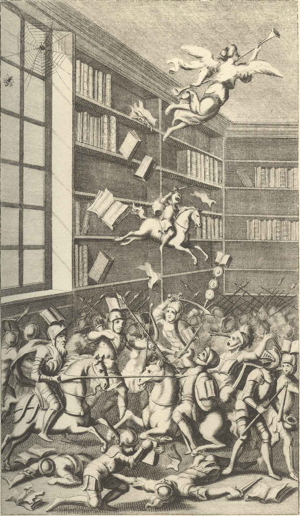 |
|
| Jonathan Swift, The Battle of the Books (1704) |
[Created: 25 Feb. 2021]
[Updated: January 31, 2023 ] |
Introduction to the “Conflicted” Western Tradition
[To come]
A common criticism of the teaching of core texts of the western tradition (WT) is that it “privileges” one civilisation over another, and that it favors one group of people or one way of thinking over others.
Competing Sub-Traditions within the WT
Part of the problem in my view, is that both sides have misunderstood what “the WT” really is. First of all, it is not a single tradition, but many conflicting and interwoven traditions, or sub-traditions if you like. Secondly, it is not ”conservative” (whatever that might mean) but has always had a “radical” component as well. Some conservaive and religious advocates of the WT have argued that it has given the modern world Christianity, individual liberty, constitutional government, rule of law, prosperity, and critical thinking (which of course it has, by and large). Its opponents have argued that the WT has given us colonialism, patriarchy, racism, slavery, and economic exploitation (which to some degree it has as well).
It seems clear to me that “the” western tradition is better understood as a collection of contending and conflicted “sub-traditions” which have been battling it out intellectually for over 2,000 years with no apparent end in sight. Thus, to give another example, one could say (and many have done so) that “the West” is Christian and point to the work of Saint Paul, Thomas Aquinas, Luther, among many; whereas one can also point to a long and persistent thread of materialist and secular thinking going back to Lucretius, Spinoza, Paine, and forward to Charles Darwin and modern science, to argue the opposite. In the Middle Ages Christianity was the dominant tradition; today one might argue that non-religious materialism has become the dominant view. And both perspectives would be correct, or partly correct.
The Sub-tradition of “Liberty vs. Power” in the WT
Yet another example are those who have argued that WC is about the “ceaseless struggle for liberty” like Ludwig von Mises and Lord Acton. The Austrian economist Ludwig von Mises, whose views have greatly influenced my own thinking about politics and economic theory, believed that “liberty” itself was the product of WC. In an article he wrote in 1950 on “The Idea of Liberty is Western” he argued that:[1]
The history of civilization is the record of a ceaseless struggle for liberty. …
The idea of liberty is and has always been peculiar to the West.What separates East and West is first of all the fact that the peoples of the East never conceived the idea of liberty. The imperishable glory of the ancient Greeks was that they were the first to grasp the meaning and significance of institutions warranting liberty…
Also in the countries of Western civilization there have always been advocates of tyranny — the absolute arbitrary rule of an autocrat or an aristocracy on the one hand and the subjection of all other people on the other hand. But in the Age of Enlightenment the voices of these opponents became thinner and thinner. The cause of liberty prevailed. …
One can also see this line of thinking in the work of Lord Acton who had intended but never was able to finish a monumental “History of Liberty.” In one of his unpublished manuscripts he wrote that the idea of liberty is “the unity, the only unity, of the history of the world, and the one principle of a philosophy of history.”[2]
To a large degree I share the perspective of Acton and Mises but I would modify it somewhat by saying that the idea of “liberty” and the related idea of the power of the state is just one of several hotly contested and conflicted “sub-traditions” within the broader WT. Thus we have had and still do today debates which rage about the need for a strong vs. a weak state, centralized vs. dispersed power, free markets vs. government regulation and planning, or more crudely “capitalism” vs. “socialism.” So what then does “the WT” have to say about the ideal size and power of the state? It all depends upon whom you read, when they wrote their book, and with whom they were arguing.
Having Conversations about the “Great Books about Liberty”
It is my hope that my “provocative pairings” or juxtapositions of texts might be of interest to others to try in their own teaching at the college level. The pairings are designed to get the reader shocked by the familiar by contrasting a classic work with a contemporary opposing text; and to encourage people to read texts beyond our immediate horizons by introducing less well-known texts which in some cases deserve to become “classics” in their own right.
It is also my hope to show the critics of “the” WT that this tradition is and never was monolithic, that the issues raised by the texts have not been resolved, and ideas and discussions from the past can inform our own discussions in the present concerning similar or related issues.
In each instance, I have also tried to find a text which most people in the Core Texts or GB tradition would regard as “classic” and pair it with a radically different, perhaps lesser known text, which reveals that there were different ways of thinking about the issue even at the time the “classic” text was written. I have done this with primarily political and economic texts, but something similar I’m sure could be done with works of art, philosophy, and literature.
Some Provocative Pairings of Texts about Liberty and Power
- Machiavelli, The Prince (1513) vs. Desiderius Erasmus, The Education of a Christian Prince (1515)
- Thomas Hobbes, Leviathan (1651) vs. James Harrington, The Commonwealth of Oceana (1656)
- Sir Robert Filmer, Patriarcha, or the Natural Power of Kings (1680) vs. John Locke, The Two Treatises of Civil Government (1689)
- Montesquieu, Spirit of Laws (1748) vs. Destutt de Tracy, A Commentary and Review of Montesquieu’s ’Spirit of Laws’ (1806)
- Adam Smith, The Theory of Moral Sentiments (1759) vs J.-J. Rousseau Discourse on the Origin and Basis of Inequality Among Men (1754) and The Social Contract (1762)
- Beccaria, An Essay on Crimes and Punishments (1764) vs. Bentham, Panopticon, or the Inspection-House (1787)
- Adam Smith, The Wealth of Nations (1776) vs. Thomas Mun, England’s Treasure by Forraign Trade; or, the Ballance of our Forraign Trade is the Rule of our Treasure (1644)
- Edmund Burke, Reflections on the French Revolution (1790) vs. Thomas Paine, Rights of Man (1791)
- Thomas Malthus, An Essay on Population (1798, 1826) vs. William Godwin, Of Population (1820)
- Friedrich List, Das National System der politischen Oekonomie (The National System of Political Economy) (1841) vs. Frédéric Bastiat, Sophismes Économiques (Economic Sophisms) (1846, 1848)
- Karl Marx, The Communist Manifesto (1848) vs. Frédéric Bastiat, The State (1848)
- John Stuart Mill, On Liberty (1859) vs. James Fitzjames Stephen, Liberty, Equality, Fraternity (1874)
- Karl Marx, Das Kapital vol. 1 (1867) vs. Frédéric Bastiat, Economic Harmonies (1851) or John Stuart Mill, Principles of Political Economy (1848)
- John Stuart Mill, Utilitarianism (1861) vs. Herbert Spencer, Social Statics (1851) or The Principles of Ethics (1879)
- George Bernard Shaw, Fabian Essays in Socialism (1889) vs. Thomas Mackay, A Plea for Liberty: An Argument against Socialism and Socialistic Legislation (1891)
- Edward Bellamy, Looking Backward: 2000–1887 (1888) vs. Eugen Richter, Pictures of the Socialist Future (1893)
- Lenin, The State and Revolution (Aug.-Sept. 1917) vs. Ludwig von Mises, “Economic Calculation in the Socialist Commonwealth“ (1920) and Socialism (1922)
- Ludwig von Mises, Nation, State, and Economy (1919) vs. Carl Schmitt on Dictatorship (1921), Political Theology (1922), and The Crisis of Parliamentary Democracy (1923)
- The Beveridge Report (Social Insurance and Allied Services) (1942) vs. Friedrich Hayek, The Road to Serfdom (1944)
The Reading Guide
1. Machiavelli, The Prince (1513) vs. Desiderius Erasmus, The Education of a Christian Prince (1515)
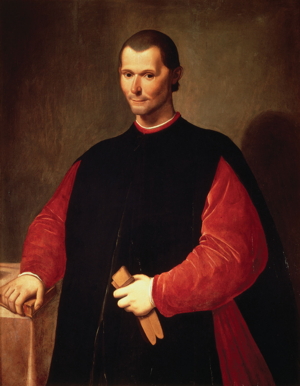 |
titlepage |
| name |
Here are two very different pieces of advice to a “prince”, i.e. any ruler of a country. Machiavelli says that the ruler should rule as ruthlessly as necessary to stay in power, and the purpose of rulership is to further the interests of those in power and the state itself. Erasmus argues that the Prince should rule according to some higher moral code which applies equally to all subjects (in this case Christianity) and that the ruler should do everything in his power to protect the interests of the people.
- Machiavelli, The Prince (1513)
- English trans.: https://oll.libertyfund.org/titles/775#lf0076-02_head_002
- Desiderius Erasmus, The Education of a Christian Prince (1515)
Since a major function of the “Prince” was to be the head of the army and wage war either in defense of the country or to expand the territory of the country by invading others, both Machiavelli and Erasmus also wrote on the role of war in gaining and keeping power and the impact war had on ordinary people.
- Machiavelli, The Art of War (1521)
- English trans. : https://oll.libertyfund.org/titles/984.
- Erasmus, The Complaint of Peace (1521)
- English trans.: https://oll.libertyfund.org/titles/87.
 |
titlepage |
| name |
2. Thomas Hobbes, Leviathan (1651) vs. either, James Harrington, The Commonwealth of Oceana (1656) , or some Leveller Tracts by Richard Overton and John Lilburne in the late 1640s, or Richard Cumberland, A Treatise of the Laws of Nature (1672)
 |
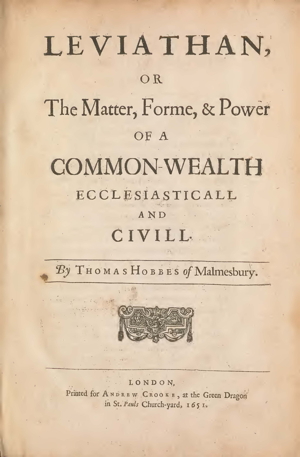 |
| name |
One could use several texts in opposition to Hobbes’ Leviathan (1651).[21] The most philosophical is Cumberland’s A Treatise of the Laws of Nature (1672)[22] who took Hobbes to task for his atheistic and absolutist interpretation of natural law, arguing instead that natural law was in fact based upon man’s natural sociability and that it imposed obligations on all people including the ruler.
A second text is Harrington’s The Commonwealth of Oceana (1656)[23] which was a thinly veiled depiction of the ideal republic which might have emerged as a result of the English Civil Wars and revolution of the late 1640s. Whereas Hobbes defended the dictatorship of absolute, divine monarchy, Harrington was dabbling with ideas of democracy and republicanism and his work would have some influence on ideas about government which emerged later in 18th century north America.
A third text or group of texts are more political in nature, such as the radical, proto-classical liberal ideas of the so-called Levellers like Richard Overton and John Lilburne who wrote some of the first modern constitutional documents known as “Agreements of the People” between 1647–49. These contained quite radical notions of representative government, broad (although limited to most but not all males) franchise, very strict limits on government power, and nearly anarchistic rights to overthrow any governments which transgressed these limited powers. See especially “The First Agreement of the People (3 Nov. 1647).” Or Richard Overton’s powerful An Arrow against all Tyrants (1646).[24]
3. Sir Robert Filmer, Patriarcha, or the Natural Power of Kings (1680) vs. John Locke, The Two Treatises of Civil Government (1689) or James Tyrrell’s Patriarcha non monarcha. The Patriarch unmonarch’d (1681)
 |
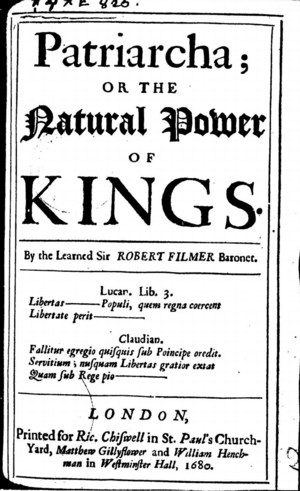 |
| name |
Filmer’s defence of the divine right of kings[25] is based on the notion that legitimate monarchy can trace its ancestry back to Adam and the sons of Adam, and is thus divine in origin and thus unchallengeable by mere mortals. This line of argument explains the great detail Locke goes into in the First Treatise.[26]
A similar contemporary text one might use is James Tyrrell’s Patriarcha non monarcha. The Patriarch unmonarch’d (1681)[27] in which there is much discussion about the power of the husband over his wife and servants and to what extent these powers are applicable to a monarch who claims similar rights over his subjects.
| image | titlepage |
| name |
4. Montesquieu, Spirit of Laws (1748) vs. Destutt de Tracy, A Commentary and Review of Montesquieu’s ’Spirit of Laws’ (1806)
| image | titlepage |
| name |
The appearance of Montesquieu’s Spirit of Laws[28] in 1748 provoked a debate which has raged ever since. Montesquieu anaysed different forms of government, the impact of climate on social organization, advocated the separation of powers as a brake on the power of the monarch, and espoused unorthodox religious views (thus getting his book placed on the Index in 1751). Destutt de Tracy[29] took issue with many of Montesquieu’s ideas and Thomas Jefferson was so interested in his ideas that his book was translated and published by Thomas Jefferson during his retirement from politics.
5. Adam Smith, The Theory of Moral Sentiments (1759) vs J.-J. Rousseau Discourse on the Origin and Basis of Inequality Among Men (1754) and The Social Contract (1762)
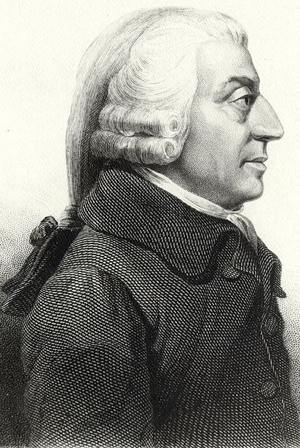 |
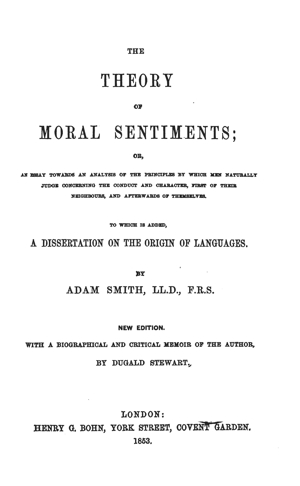 |
| name |
We have here two very contrasting analyses of the impact of the civilizing process on individuals - a very pessimistic one by Rousseau who thought civilisation had a corrupting influence on people who were happier in a state of nature;[30] and the optimistic view of Smith that individuals learnt to be polite, respectful, law-abiding citizens partly thorough their innate sense of “sympathy” they felt towards others like themselves, and partly from their self-interest, since living in society surrounded by others enabled them to experience the benefits of the division of labour and free trade.[31]
 |
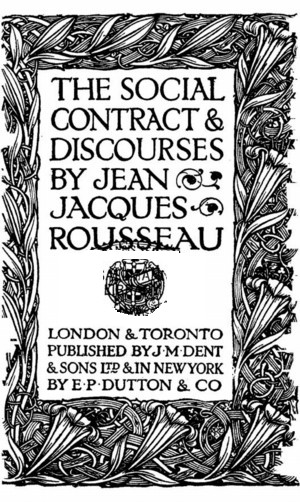 |
| name |
Another striking difference in their views is that Rousseau thought that societies needed to guided by a wise and far-seeing “Legislator” who would create the legal, political, and economic foundations of society and guide men to act in their own interests since they were largely incapable of doing that for themselves. Smith, on the other hand, developed the idea of the “invisible hand” (introduced in his Wealth of Nations), by which he meant that men could be left alone to pursue their own self-interests without outside government since, in order to benefit themselves by buying and selling in the market (i.e. making profits), they first had to serve the interests of their fellows by producing things their fellows wanted to buy.
- Jean-Jacques Rousseau, Discourse on the Origin and Basis of Inequality Among Men (1754) [HTML] and The Social Contract or Principles of Political Right (abc) [HTML]
- Adam Smith, The Theory of Moral Sentiments (1759)
- The Theory of Moral Sentiments; or, An Essay towards an Analysis of the Principles by which Men naturally judge concerning the Conduct and Character, first of their Neighbours, and afterwards of themselves. To which is added, A Dissertation on the Origins of Languages. New Edition. With a biographical and critical Memoir of the Author, by Dugald Stewart (London: Henry G. Bohn, 1853). In HTML and facs. PDF.
6. Beccaria, An Essay on Crimes and Punishments (1764) vs. Bentham, Panopticon, or the Inspection-House (1787)
| image | titlepage |
| name |
Judicial and legal reform was a key issue for thinkers during the Enlightenment who wanted to reform the brutal and often draconian system of punishments all European countries imposed on “criminals.” One of the main concerns was that punishments should be proportional to the crimes committed and that draconian punishments like execution be only used for very serious and not minor crimes. The Italian legal philosopher, political economist and politician Cesare Bonesana di Beccari (1738–1794) went even further in advocating an end to torture and the death penalty.[32]
Another legal reformer was the lawyer and theorist of utilitarianism Jeremy Bentham (1748–1832) who was very interested in prison reform based upon his ideas about utilitarianism and the pleasure/pain principle which is used to induce people to change their behaviour. His idea of a new prison system based upon the constant inspection of inmates, the “Panopticon; Or, the Inspection-House” (1787),[33] was intended to be more humane but many enlightened reformers regarded it as just another kind of torture.
7. Adam Smith, The Wealth of Nations (1776) vs. Thomas Mun, England’s Treasure by Forraign Trade; or, the Ballance of our Forraign Trade is the Rule of our Treasure (1644)
 |
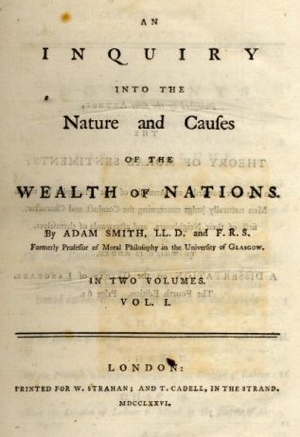 |
| Adam Smith (1723-1790) | Title page of the 1st ed. of The Wealth of Nations (1776) |
Smith’s Wealth of Nations (1776)[34] is rightly regarded as one of the foundational texts of modern economics and the idea of free trade and free markets. He was writing to oppose the mercantilist school which argued that trade protection (tariffs, import bans) were necessary in order to maintain a positive “balance of trade” for the country and thus a net inflow of bullion (gold).
 |
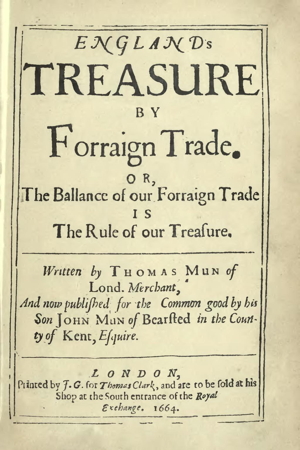 |
| Thomas Mun (1571-1641) | England’s Treasure by Forraign Trade (1644) |
The standard defense of mercantilism and trade protection was by Thomas Mun, England’s Treasure by Forraign Trade (1644).[35]
Much less known are the previous authors and texts of the mercantilist school (i.e. trade protection in order to maintain a positive “balance of trade” for the country and thus a net inflow of bullion (gold)) which he spent so much time rebutting in WoN. If the reader does not know who and what these authors and texts were, Smith’s attack has much less meaning. The only consolation perhaps, is that these 17th and 18th century mercantilist or protectionist ideas persisted well into the 19th century (Friedrich List) and in own time (Donald Trump) so their ideas are not completely unfamiliar to the modern reader. However the standard defense of mercantilism and trade protection was by Thomas Mun, England’s Treasure by Forraign Trade (1644) whose tract is the one I have chosen to go with Smith.[13]
8. Edmund Burke, Reflections on the French Revolution (1790) vs. Thomas Paine, Rights of Man (1791)
| image | titlepage |
| name |
The publication of Richard Price’s sermon on “A Discourse on the Love of Our Country” in November 1789,[36] in which he praised both the American and the French Revolutions, prompted Edmund Burke to write his critique of the French Revolution Reflections on the Revolution in France in 1790.[37] and his more extreme essays on "The Regicide Peace" (1795).
This began a debate about the nature of the French Revolution which continues to this day: was it a step towards individual liberty and constitutional government or towards chaos and tyranny? Burke’s critique was quickly replied to by supporters of the Revolution such as Thomas Paine (1791)[38] and William Godwin (1793).[39] Burke, in turn, returned to the topic in numerous other writings.
Women also participated in this discussion about the impact of the French Revolution with both Catharine Macaulay[40] and Mary Wollstonecraft supporting it against Burke’s criticisms. Wollstonescraft is also noteworthy for extrapolating from the “rights of man” (the subject of her first book” to the “rights of woman” in her second.[41]
9. Thomas Malthus, An Essay on Population (1798, 1826) vs. William Godwin, Of Population (1820) or Bastiat "On Population" (1846??. 1851)
| image | titlepage |
| name |
In the late 18th and early 19th centuries a debate arose over the impact that rapidly increasing population would have on the standard of living. The pessimistic school, represented by Malthus,[42] argued that population would inevitably increase at a geometric rate, whilst agricultural output would only increase arithmetically. Thus, the standard of living of ordinary people would suffer unless they practised some kiind of family planning and restraint. The optimists, many of whom were free market economists or political theorists like William Godwin,[43] argued that human ingenuity, more scientific agricultural practises, and efficiencies of the free market would cope with expanding populations and that, in fact, life would get much better for ordinary people.
Also Bastiat's rejection of Malthusian pessimism; benefits of large urban centres - article/chapter "On Population".
10. Friedrich List, Das National System der politischen Oekonomie (The National System of Political Economy) (1841) vs. Frédéric Bastiat, Sophismes Économiques (Economic Sophisms) (1846, 1848) and/or Henry George, Protection or Free Trade (1886)
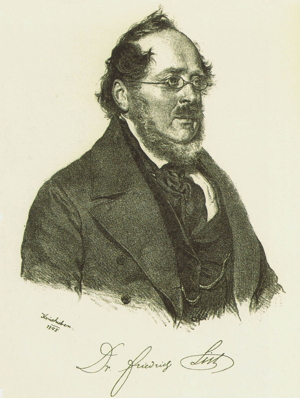 |
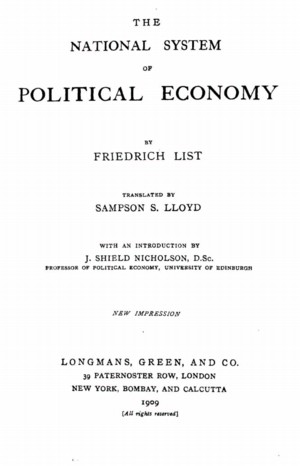 |
| Friedrich List (1789-1846) |
A 19th century pairing of a classic defence of protectionism and a defender of free trade. The German nationalist and protectionist economist Friedrich List[44] laid the foundation stone for the modern version of protectionism, such as the need to protect and subsidize “infant industries” in order for the modern nation state to be strong economically and thus militarily. This was opposed by Frédéric Bastiat,[45] the anti-protectionist free trader, who wrote some of the greatest economic journalism ever written. His writings attacking and mocking protectionism are funny, clever, and very approachable even for those who know no economics.
| image | titlepage |
| name |
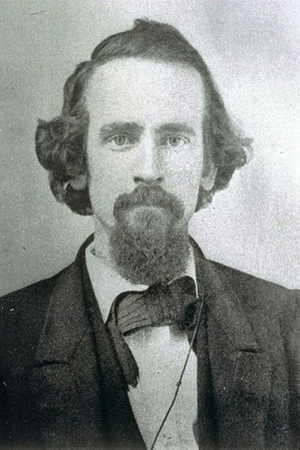 |
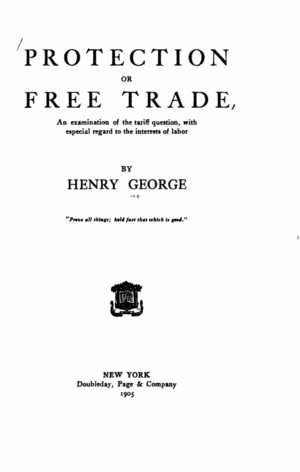 |
| Henry George (1839-1897) |
11. Karl Marx, The Communist Manifesto (1848) vs. Frédéric Bastiat, The State (1848)
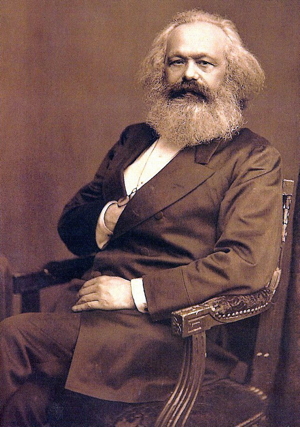 |
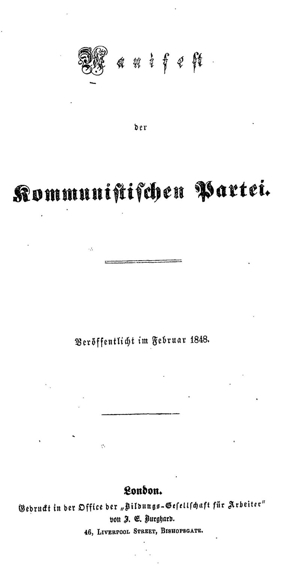 |
| Karl Marx (1818-1883) | Title page of The Communist Manifesto (1848) |
The Manifesto has some of Marx’s best journalism,[46] a clear statement of his theory of class and the evolution of societies through different economic stages, the inevitable end-crisis of capitalism, a list of demands to reform society in a socialist direction (a list very similar to the things the new welfare states enacted in Europe following the end of WW2), and some very, very bad economics (such as the labour theory of value). Bastiat[47] wrote a series of pamphlets attacking socialism on the grounds of its violation of individual rights to liberty and property, and the economic irrationality of its program.
Marx and Engels had written the Manifesto in late 1847 and had gone to Paris to distribute it among the ex-patriot German workers during the early weeks of the February Revolution in one of the political clubs which sprang up once censorship collapsed (“le Club des Travailleurs allemands” (the German Workers Club)). The Manifesto has some of Marx’s best journalism, a clear statement of his theory of class and the evolution of societies through different economic stages, the inevitable end-crisis of capitalism, a list of demands to reform society in a socialist direction (a list very similar to the things the new welfare states enacted in Europe following the end of WW2), and some very, very bad economics (such as the labour theory of value).
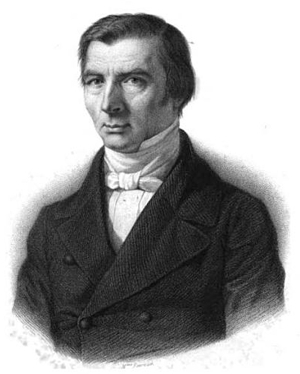 |
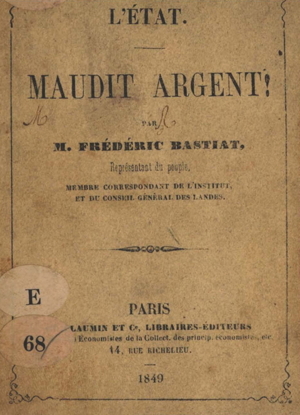 |
| Frédéric Bastiat (1801-1850) | Title page of the pamphlet ed. of "The State" (1848) |
Bastiat was also in Paris at the time and was involved in the revolution, getting elected to the new Constituent Assembly of the Second Republic. He too participated in one of the political clubs, the “Club de la Liberté du Travail” (the Club for the Liberty of Working) and could easily have met Marx, but didn’t to my knowledge. A few months later he wrote one of the classic criticisms of socialism and the redistributive state in a pamphlet simply called “L’État” (The State) (June and Sept. 1848), in which he defined the state as: [18]
The state is the great fiction by which everyone endeavors to live at the expense of everyone else.
The contrasts between Marx’s view of the state and Bastiat’s could not be greater and the two thinkers laid out rival theories of politics (limited state power protecting the liberty and property of all individuals vs. the state controlling everything in the name of the working class) and economics ( laissez-faire non-intervention in the economy vs. state ownership or control of nearly every aspect of the economy) the pro and cons of which have been argued about ever since, and have even resurfaced again today.[19]
12. John Stuart Mill, On Liberty (1859) vs. James Fitzjames Stephen, Liberty, Equality, Fraternity (1874)
| image | titlepage |
| name |
John Stuart Mill has a controversial place in the classical liberal tradition. He shocked many conservatives with his support for women’s suffrage in The Subjection of Women (1869) and seemed to justify considerable state intervention in the economy in his Principles of Political Economy (1848). One of his most influential books, On Liberty (1859),[48] prompted a critique by Stephen[49] who argued that Mill’s idea of liberty and equality undermined the older liberal notions of “ordered liberty” and “equality under law”. Stephen criticized Mill for turning abstract doctrines of the French Revolution into “the creed of a religion.” Only the constraints of morality and law make liberty possible, warned Stephen, and attempts to impose unlimited freedom, material equality, and an indiscriminate love of humanity will lead inevitably to coercion and tyranny.
13. Karl Marx, Das Kapital vol. 1 (1867) vs. Frédéric Bastiat, Economic Harmonies (1851) or John Stuart Mill, Principles of Political Economy (1848)
 |
titlepage |
| name |
The recognized pinnacle of the classical school of economics (Adam Smith, David Ricardo, Thomas Malthus) was J.S. Mill’s Principles of Political Economy (1848)[50] with its concern for economic growth, free trade, the productivity of the free market, the profit system, the danger of over-population, and a general presumption in favour of laissez-faire government policy.
Criticism of the classical school came from two different directions - from the socialists and Marxists, and from other free market economists who wrote later in the century. Karl Marx provided the most detailed critique in his multi-volume work Das Kapital (Capital) (1867, 1885, 1894).[51] Marx prided himself on having discovered the “laws” which governed the operation of the capitalist system, laws which would inevitably lead to its collapse. He believed in the labour theory of value (that things had value because of the amount of labour expanded in creating them), that the payment of wages to workers by their employer was inherently exploitative because the worker did not receive the “full value” of the work, that workers’s wages would tend to fall to the absolute minimum required to keep them alive and reproduce, that capitalist businesses would increasingly become less profitable as competition reduced what they could receive for their products, and that the system would be inevitably overthrown by an uprising of the organized exported workers.
Defenders of the “capitalist system” like the French economist Frédéric Bastiat argued the exact opposite to Marx on nearly every matter: that things had value because of the subjective value people (consumers) placed on their regardless of how much labour was used to make them, that wages were a voluntary agreement reached between empty and worker in which both parties benefited, that workers’s wages would rise as more capital was invested in machinery and as the division of labour deepened, that capitalists would find ever more needs consumers wanted satisfied and would continue to grow and be profitable, and that the system only malfunctioned because governments interfered with the operation of the otherwise “harmonious” free market. Bastiat wrote a series of witty but deeply insight anti-socialist pamphlets between 1848 and 1850, and left an unfinished treatise on economics with a radically new defense of free market economics, Economic Harmonies (1850, 1851).[52]
14. John Stuart Mill, Utilitarianism (1861, 1863) vs. Herbert Spencer, Social Statics (1851) or The Principles of Ethics (1879)
| image | titlepage |
| name |
Within classical liberalism there was a division between two different ways of justifying individual liberty and a limited government. The older, more traditional way was to ground the defence of liberty on natural law, which was a tradition which went back to the ancient Greeks and Romans, and which had a revival in the 17th century (most notably with John Locke’s defence of liberty in his Two Treatises of Government). [53] One of the best defenders of the natural rights approach in the 19th century was the English theorist Herbert Spencer who wrote an early work, Social Statics (1851), in which he developed his idea of justice and “the law of equal freedom” which stated that “every man has freedom to do all that he wills, provided he infringes not the equal freedom of any other man.” https://oll.libertyfund.org/title/273/6325. He expanded his ideas in a later work The Principles of Ethics (1879).[54]
In contrast, or even opposition, to this tradition was the “utilitarian” or “Benthamite” tradition which rejected natural law and natural rights as “nonsense” and argued that one should judge what the government should or should not do on whether or not it pursued “the greatest good of the greatest number” of people. In other words, on the grounds of “utility” or usefulness and not on individual “rights.” This line of thinking was developed by Jeremy Bentham, James Mill, and John Stuart Mill, and eventually became the dominant form of liberalism by the late 19th century. J.S. Mill’s defense of Utilitarianism[55] came nearly midway between Spencer’s two works.
15. George Bernard Shaw, Fabian Essays in Socialism (1889) vs. Thomas Mackay, A Plea for Liberty: An Argument against Socialism and Socialistic Legislation (1891)
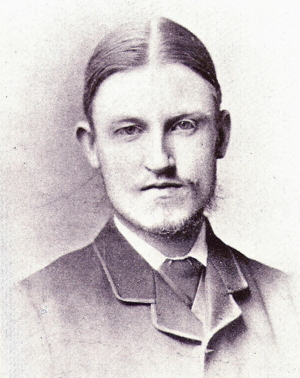 |
titlepage |
| name |
In the late 19th century the classical liberal, free market orthodoxy was beginning to be challenged by socialists like George Bernard Shaw,[56] who put together a collection of essays in 1889 advocating greater intervention by the state in the economy. Unlike the Marxists, who desired revolutionary change, the “Fabian socialists” advocated incremental change through the parliamentary system and would have considerable success in Britain and Australia, leading eventually to the formation of the modern welfare state after 1945. This volume provoked a reply by supporters of private property and laissez-faire economics led by Thomas Mackay.[57]
16. Edward Bellamy, Looking Backward: 2000–1887 (1888) vs. Eugen Richter, Pictures of the Socialist Future (1893)
| image | titlepage |
| name |
The American socialist Bellamy[58] wrote a utopian novel about a man who fell asleep in 1887 and woke up in an American socialist paradise in 2000 where people lived in complete harmony since economic competition had been abolished, the state owned all property and thus controlled and planned every economic activity, and there was abundance for all. The German classical liberal political Richter[59] wrote a dystopian novel in 1893 about what would happen to Germany if the socialism espoused by the trade unionists, social democrats, and Marxists was actually put into practice. He argued that that government ownership of the means of production and centralised planning of the economy would not lead to abundance as the socialists predicted would happen when capitalist “inefficiency and waste” were “abolished”. The problem of incentives in the absence of profits, the free rider problem, the public choice insight about the vested interests of bureaucrats and politicians, the connection between economic liberty and political liberty, were all wittily addressed by Richter.
17. Lenin, The State and Revolution (Aug.-Sept. 1917) vs. Ludwig von Mises, “Economic Calculation in the Socialist Commonwealth“ (1920) and Socialism (1922)
| image | titlepage |
| name |
Neither Marx nor any other late 19th or early 20th century Marxist thinker gave much thought to how a centrally planned communist economy would operate once all “the means of production” had been taken from their private owners and run by the state, and wage labour and free market pricing for goods, services, and capital had been abolished. On the eve of the October 1917 Revolution Lenin began thinking about this problem and his only solution was to model running the entire economy on the way the state had run the Post Office.[60] The Austrian economics Ludwig von Mises[61] quickly realized that without free market prices to tell entrepreneurs what goods and services were in high or low demand, and how scarce or abundant they were, economic calculation would be impossible under socialism and the economy would soon collapse.
18. Ludwig von Mises, Nation, State, and Economy (1919) vs. Carl Schmitt on Dictatorship (1921), Political Theology (1922), and The Crisis of Parliamentary Democracy (1923)
| image | titlepage |
| name |
Classical liberals like the Austrian economist Ludwig von Mises warned that the interventionist economic policies introduced during the war (“war socialism”), chronic debt, and disruption to free trade would lead to economic collapse, high inflation, and calls from disgruntled consumers and nationalists for radical solutions like socialism and authoritarian governments. Liberal democracy, constitutionalism, and free markets would be abandoned with catastrophic consequences. Mises expressed these concerns very soon after the war ended and accurately predicted many of the events which would occur in the 1920s.[62] He followed this a few later with a defence of classical liberalsism in 1927. At the same time, the conservative German jurist Carl Schmitt laid out his criticisms of parliamentary democracy and his support for strong authoritarian, even dictatorial government in a series of essays on Dictatorship (1921), Political Theology (1922), and The Crisis of Parliamentary Democracy (1923).[63] His ideas would have a significant impact on the National Socialist Party after it came to power in 1932.
Another defender of liberal democracy who wrote at the same time was the English historian, jurist, and diplomat Viscount James Bryce (1838–1922) who wrote a detailed defence of democratic government in 1921, the war before he died.[64]
Of course, in the background of these debates, is the much more troubling expression of anti-liberal and democratic thought in the work of Adolph Hitler, Mein Kampf (My Struggle) (1925–26).
19. The Beveridge Report (Social Insurance and Allied Services) (1942) vs. Friedrich Hayek, The Road to Serfdom (1944)
| image | titlepage |
| name |
The dramatic increase in government intervention in and control of the economy in wartime became the model for many socialists in peacetime. This was true with German “Kriegsozialismus” (war socialism) in the First World War for the Bolsheviks and for the architects of the British welfare state created after the Second World war by the Labour Party. The Beveridge Report[65] was drawn up during the war with detailed plans on how the first steps in creating a welfare state might be taken using the experience and even the same personnel who worked on government planning during the war. Also during the war, the Austrian economist Friedrich Hayek,[66] who was teaching at the London School of Economics, warned that all the incremental regulations and controls introduced during the war would eventually lead to fully fledged socialism, or what he called a new kind of “serfdom.”
Endnotes
-
Ludwig von Mises, “The Idea of Liberty is Western” (1950) in Money, Method, and the Market Process. Essays by Ludwig von Mises. Selected by Margin von Mises. Edited and with an Introduction by Richard M. Ebeling (Indianapolis: Liberty Fund, 2016), pp. 309–10. ↩
-
Quoted in Gertrude Himmelfarb, Lord Acton: A Study in Conscience and Politics (University of Chicago Press: Phoenix Books, 1962), p. 132. ↩
-
-
-
-
-
-
-
-
-
-
-
-
-
-
-
-
Frédéric Bastiat, The Collected Works of Frédéric Bastiat. Vol. 2: The Law, The State, and Other Political Writings, 1843–1850 (2012), p. 97. https://oll.libertyfund.org/titles/2450#Bastiat_1573-02_672. Bastiat also wrote 12 significant anti-socialist pamphlets between 1848 and 1850, including “Property and Law” (May 1848), “The State” (Sept. 1848), “Protectionism and Communism’ (Jan. 1849), “Plunder and the Law” (May 1850), “The Law” (July 1850), and “What is Seen and What is Not Seen” (July 1850). ↩
-
-
-
Thomas Hobbes, Leviathan (1651) https://oll.libertyfund.org/titles/869. ↩
-
Richard Cumberland), A Treatise of the Laws of Nature (1672) https://oll.libertyfund.org/titles/1353. ↩
-
James Harrington, The Commonwealth of Oceana (1656) <https://oll.libertyfund.org/titles/916#lf0050_head_016>. ↩
-
Leveller Tracts by Richard Overton and John Lilburne in the late 1640s https://oll.libertyfund.org/pages/leveller-tracts-listed-by-author or [Several Hands] “The First Agreement of the People (3 Nov. 1647)” in An Anthology of Leveller Tracts: Agreements of the People, Petitions, Remonstrances, and Declarations (1646–1659) <https://oll.libertyfund.org/pages/leveller-anthology-agreements#T115>; Richard Overton, An Arrow against all Tyrants (1646) https://oll.libertyfund.org/titles/overton-an-arrow-against-all-tyrants. ↩
-
Sir Robert Filmer, Patriarcha, or the Natural Power of Kings (1680) https://oll.libertyfund.org/titles/221. ↩
-
John Locke, Two Treatises of Government (1680–83) https://oll.libertyfund.org/titles/222 ↩
-
James Tyrrell, Patriarcha non monarcha. The Patriarch unmonarch’d (1681) https://oll.libertyfund.org/titles/2168. ↩
-
Montesquieu, Spirit of Laws (1748) https://oll.libertyfund.org/titles/837. ↩
-
Destutt de Tracy, A Commentary and Review of Montesquieu’s ’Spirit of Laws’ (1806) https://oll.libertyfund.org/titles/960. ↩
-
Rousseau Discourse on the Origin and Basis of Inequality Among Men (1754) <https://oll.libertyfund.org/titles/638#lf0132_head_061> and Rousseau, The Social Contract or Principles of Political Right <https://oll.libertyfund.org/titles/638#lf0132_head_005> in The Social Contract and Discourses by Jean-Jacques Rousseau, translated with an Introduction by G.D. H. Cole (London and Toronto: J.M. Dent and Sons, 1923). ↩
-
Adam Smith, The Theory of Moral Sentiments; or, An Essay towards an Analysis of the Principles by which Men naturally judge concerning the Conduct and Character, first of their Neighbours, and afterwards of themselves. To which is added, A Dissertation on the Origins of Languages. New Edition. With a biographical and critical Memoir of the Author, by Dugald Stewart (London: Henry G. Bohn, 1853). https://oll.libertyfund.org/titles/2620. ↩
-
Cesare Bonesana di Beccaria, An Essay on Crimes and Punishments. By the Marquis Beccaria of Milan. With a Commentary by M. de Voltaire. A New Edition Corrected. (Albany: W.C. Little & Co., 1872) https://oll.libertyfund.org/titles/2193. ↩
-
Bentham, “Panopticon; Or, the Inspection-House” (1787) https://oll.libertyfund.org/titles/bentham-the-works-of-jeremy-bentham-vol-4#lf0872-04_head_010. ↩
-
Adam Smith, The Wealth of Nations (1776) (Cannan ed.) https://oll.libertyfund.org/titles/171. ↩
-
Thomas Mun, England’s Treasure by Forraign Trade; or, the Ballance of our Forraign Trade is the Rule of our Treasure (1644) in John Ramsay McCulloch, A Select Collection of Early English Tracts on Commerce (1856) https://oll.libertyfund.org/titles/2000. ↩
-
Richard Price, “A Discourse on the Love of Our Country” (November 1789) https://oll.libertyfund.org/titles/368. ↩
-
Edmund Burke, Reflections on the French Revolution (1790) https://oll.libertyfund.org/titles/656. ↩
-
Thomas Paine, Rights of Man (1791) https://oll.libertyfund.org/titles/798. ↩
-
William Godwin, An Enquiry Concerning Political Justice, and its Influence on General Virtue and Happiness (London: G.G.J. and J. Robinson, 1793). https://oll.libertyfund.org/titles/90. ↩
-
Catharine Macaulay, Observations on the Reflections of the Right Hon. Edmund Burke, on the Revolution in France, in a Letter to the Right Hon. the Earl of Stanhope (London: C. Dilly, 1790). 3/21/2019. https://oll.libertyfund.org/titles/1664 ↩
-
Mary Wollstonecraft, A Vindication of the Rights of Men, in a Letter to the Right Honourable Edmund Burke, occaisioned by his Reflections on the Revolution in France (2nd edition London, Printed for J. Johnson, 1790). https://oll.libertyfund.org/titles/991; Mary Wollstonecraft, An Historical and Moral View of the Origin and Progress of the French Revolution and the Effect it Has Produced in Europe (London: J. Johnson, 1795). https://oll.libertyfund.org/titles/226. ↩
-
Thomas Malthus, An Essay on Population (1st ed. 1798; 6th ed. 1826) https://oll.libertyfund.org/titles/1944. ↩
-
William Godwin, Of Population (1820) https://oll.libertyfund.org/titles/1720. ↩
-
Friedrich List, Das National System der politischen Oekonomie (The National System of Political Economy) (1841) https://oll.libertyfund.org/titles/315. ↩
-
Frédéric Bastiat, Sophismes Économiques (Economic Sophisms) (1846, 1848) in Collected Works, vol. 3 https://oll.libertyfund.org/titles/2731. ↩
-
Karl Marx, Manifesto of the Communist Party (1848) https://oll.libertyfund.org/pages/marx-manifesto. ↩
-
Frédéric Bastiat, The State (1848) in Collected Works, vol. 2 https://oll.libertyfund.org/titles/2450#Bastiat_1573-02_672. ↩
-
John Stuart Mill, On Liberty (1859) https://oll.libertyfund.org/titles/233. ↩
-
James Fitzjames Stephen, Liberty, Equality, Fraternity (1874) https://oll.libertyfund.org/titles/572. ↩
-
John Stuart Mill, The Collected Works of John Stuart Mill, Volume II - The Principles of Political Economy with Some of Their Applications to Social Philosophy (Books I-II), ed. John M. Robson, introduction by V.W. Bladen (Toronto: University of Toronto Press, London: Routledge and Kegan Paul, 1965). https://oll.libertyfund.org/titles/102 and https://oll.libertyfund.org/titles/243. ↩
-
Karl Marx, Capital: A Critique of Political Economy. Volume I: The Process of Capitalist Production, by Karl Marx. Trans. from the 3rd German edition, by Samuel Moore and Edward Aveling, ed. Frederick Engels. Revised and amplified according to the 4th German ed. by Ernest Untermann (Chicago: Charles H. Kerr and Co., 1909). http://oll.libertyfund.org/titles/965. See also “Socialism: A Study Guide and Reader” http://oll.libertyfund.org/pages/socialism. ↩
-
See the Liberty Matters discussion of “Frédéric Bastiat and Political Economy (July, 2013)” https://oll.libertyfund.org/pages/bastiat-and-political-economy; the older translation of Economic Harmonies by the Foundation for Economic Education (1964), Frédéric Bastiat, Economic Harmonies, trans by W. Hayden Boyers, ed. George B. de Huszar, introduction by Dean Russell (Irvington-on-Hudson: Foundation for Economic Education, 1996). https://oll.libertyfund.org/titles/79; and a draft of LF’s new translation of Economic Harmonies https://oll.libertyfund.org/pages/cw5; and “Bastiat’s Anti-socialist Pamphlets, or “Mister Bastiat’s Little Pamphlets”” https://oll.libertyfund.org/pages/cw4#chapter-7-8727. ↩
-
On the 17th and 18th century revival of natural law thinking, see LF’s 40 volume collection the Natural Law and Enlightenment Series edited by Knud Haakonssen https://oll.libertyfund.org/groups/59. ↩
-
Herbert Spencer, Social Statics: or, The Conditions essential to Happiness specified, and the First of them Developed (London: John Chapman, 1851). https://oll.libertyfund.org/titles/273; Herbert Spencer, The Principles of Ethics, introduction by Tibor R. Machan (Indianapolis: LibertyClassics, 1978). 2 vols. <https://oll.libertyfund.org/titles/1882. ↩
-
Mill’s Utilitarianism (1861) in John Stuart Mill, The Collected Works of John Stuart Mill, Volume X - Essays on Ethics, Religion, and Society, ed. John M. Robson, Introduction by F.E.L. Priestley (Toronto: University of Toronto Press, London: Routledge and Kegan Paul, 1985). https://oll.libertyfund.org/titles/241#lf0223-10_head_045. ↩
-
George Bernard Shaw, Fabian Essays in Socialism (1889) https://oll.libertyfund.org/titles/298. ↩
-
Thomas Mackay, A Plea for Liberty: An Argument against Socialism and Socialistic Legislation (1891) https://oll.libertyfund.org/titles/313. ↩
-
Unfortunately, we do not have copy of Edward Bellamy, Looking Backward: 2000–1887 (1888) online. ↩
-
Eugen Richter, Pictures of the Socialist Future (1893) https://oll.libertyfund.org/titles/295. ↩
-
Lenin, The State and Revolution (Aug.-Sept. 1917). Online: https://www.marxists.org/archive/lenin/works/1917/staterev/. ↩
-
Ludwig von Mises presented his ideas first in an article “Economic Calculation in the Socialist Commonwealth“ (1920) and then in expanded form in his book Die Gemeinwirtschaft (Socialism) (1922). Ludwig von Mises, Die Gemeinwirtschaft. Untersuchungen über den Sozialismus. Zweite, umgearbeitete Auflage (Jena: Gustave Fischer, 1932). 1st ed. 1922. Ludwig von Mises, Socialism: An Economic and Sociological Analysis, trans. J. Kahane, Foreword by F.A. Hayek (Indianapolis: Liberty Fund, 1981). http://oll.libertyfund.org/titles/1060, especially “Appendix . A Contribution To The Critique Of Attempts To Construct A System Of Economic Calculation For The Socialist Community” http://oll.libertyfund.org/titles/1060#lf0069_head_216. The original essay is “Die Wirtschaftsrechnung im sozialistischen Gemeinwesen” in Archiv für Sozialwissenschaft und Sozialpolitik, 1920–21, 47: 86–121; online at https://www.mises.de/public_home/article/94 and in English nCollective Economic Planning, Friedrich A. Hayek, ed. Clifton, NJ: Kelley Publishing, 1975, pp. 87–130, and Auburn, AL: Ludwig von Mises Institute, 1990. https://mises.org/library/economic-calculation-socialist-commonwealth/html. ↩
-
Ludwig von Mises, Nation, State, and Economy: Contributions to the Politics and History of Our Time, trans. Leland B. Yeager, ed. Bettina Bien Greaves (Indianapolis: Liberty Fund, 2006). https://oll.libertyfund.org/titles/1819; Ludwig von Mises, Liberalism: The Classical Tradition, trans. Ralph Raico, ed. Bettina Bien Greaves (Indianapolis: Liberty Fund, 2005). https://oll.libertyfund.org/titles/1463. ↩
-
Carl Schmitt, Dictatorship. From the Origin of the Modern Concept of Sovereignty to Proletarian Class Struggle (1921), trans. by M. Hoelzl and G. Ward, (Cambridge: Polity Press, 2014); Political Theology. Four Chapters on the Concept of Sovereignty (1922), trans. by G. Schwab, (Chicago: University of Chicago Press, 2005); The Crisis of Parliamentary Democracy (1923), trans. by E. Kennedy, (Cambridge/MA: MIT Press, 1985). ↩
-
Viscount James Bryce, Modern Democracies, (New York: Macmillan, 1921). 2 vols. https://oll.libertyfund.org/titles/2083. ↩
-
The Beveridge Report is online http://www.sochealth.co.uk/public-health-and-wellbeing/beveridge-report/. ↩
-
Unfortunately we do not have Hayek’s Road to Serfdom online nor do we have it for sale as part of LF’s Collected Works of F.A. Hayek. We do have Socialism and War: Essays, Documents, Reviews. Edited by Bruce Caldwell (Indianapolis: Liberty Fund, 1997). https://www.libertyfund.org/books/socialism-and-war. ↩